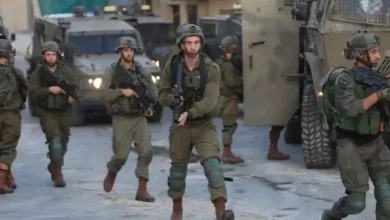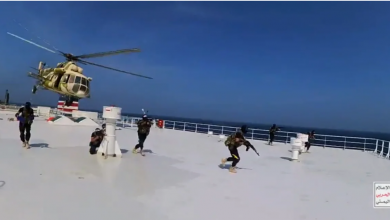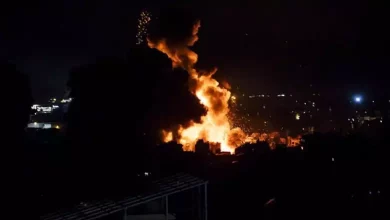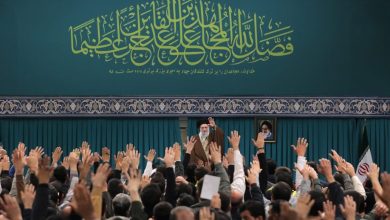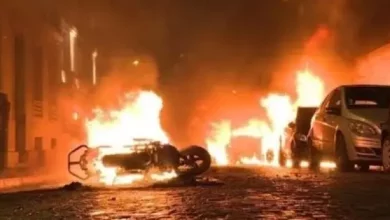High Morale Promises Definite Victory for Hezbollah: Larijani
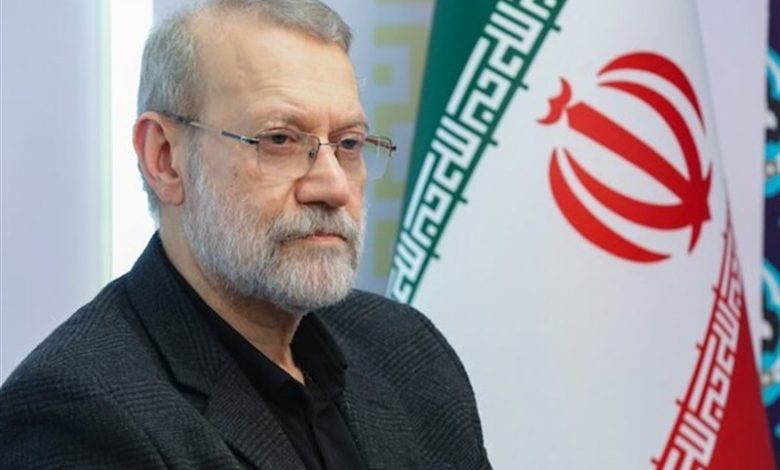
Ali Larijani, an advisor to the Leader of the Islamic Revolution, lauded the strong and spirited members of Hezbollah, saying such high morale and optimism will lead the Lebanese resistance group to victory.
Ali Larijani, a member of the Expediency Discernment Council, delivered a message last week from Leader of the Islamic Revolution Ayatollah Seyed Ali Khamenei to Syrian President Bashar al-Assad, and Nabih Berri, Speaker of the Lebanese Parliament, during his recent visit to Syria and Lebanon.
This trip elicited many positive feedbacks concerning the Resistance Front in both regional and international media, while also being the subject of various analyses and evaluations. On this occasion, Khamenei.ir conducted an interview with Larijani to analyze and examine the background, events, and his firsthand observations from this trip, as well as its political, international, and on-the-ground implications in the current special circumstances of the region.
The following is the abridged version of this interview, released by khamenei.ir:
Question: Let’s talk about the morale of Hezbollah commanders, the leadership of Sheikh Naim Qassem, and how Hezbollah is organized now that Martyr Nasrallah is no longer with us. What are your thoughts on this?
Dr. Larijani: We should divide this particular time period – starting from around September 15, 2024, when the pager incident occurred, and following the martyrdoms of Seyed Hassan Nasrallah, Seyed Hashem Safieddine, and other important Hezbollah members – into two parts. The first period, lasting approximately 20-30 days, was marked by a significant setback. Following this, a second phase ensued.
The fact that three to four thousand members of Hezbollah were affected by the pager incidents, coupled with the martyrdom of their leader, was very significant. This period created a perception within the Zionist regime that Hezbollah was finished, and this was also reflected in numerous Arab and Western countries. Some Israeli messages also reflected this belief. However, after this initial period, the situation quickly shifted as what seemed like a downturn suddenly turned into an upward trajectory.
Why did this occur? Well, considering the nature of the incident, it was expected that the Resistance forces, who are known for their strong beliefs, would react strongly. I heard that when the news of Seyed Hassan Nasrallah’s martyrdom was announced, it was a deeply moving experience, and many of their frontline fighters wept and grieved. However, shortly afterwards, they quickly unified in a solemn pledge to defend Lebanon until their very last breath.
This was the effect that arose following Seyed Hassan Nasrallah’s martyrdom. Contrary to what Netanyahu and Israel thought would happen – (that they had hit Hezbollah and that was the end of them) – the Resistance forces gained new strength. They began fighting with new energy, much like the fighters during the Day of Ashura. This caused a shift in the situation, leading to a complete replacement of all personnel.
Political ideologies from our own, which have also been very accommodating towards Israel in the past, now feel that if they allow Israel to continue doing whatever it pleases, it will swallow them very quickly. Therefore, they are interested in seeing Hezbollah remain strong.
During this trip, I witnessed spirits that were as steadfast as the fighters on the Day of Ashura. They embodied the spirit of those who, as recounted in our hadiths and narrations, fought on that day and stood firm for their beliefs.
For example, I spent about an hour with Martyr Mohammad Afif before his martyrdom and we talked. His words to me were: “We stand firm. Know that we are prepared to stand our ground. None of our friends in Lebanon should think that we are weak. We are ready.” This is just one example.
Many other Hezbollah members I met were incredibly strong and spirited. In the heat of battle, morale is everything. These individuals were brimming with it and they were optimistic about the future. Not only were they joyful but they were also resolute and hopeful about the future. I was certain that they would attain victory. Their strong spirits, their dedication to their work, and their courage in action will undoubtedly lead them to victory.
In my opinion, the Zionist regime made a mistake here. They thought that after the bombings and the pager attack, etc. they would reach the Litani River within a week or two. Well, over thirty days have passed now and they have not been able to launch any serious ground invasions and are constantly suffering casualties. Hezbollah’s main capabilities have not yet been challenged. They still have substantial resources, and have become self-sufficient in producing their own resources. They previously claimed to have destroyed some of their missile silos.
Well, if that’s the case, then where are the missiles that they are firing coming from? They’re not coming from Mars. They have them and are manufacturing them. I believe the Zionist regime will greatly regret this in the future. Of course, we have always said that we will support all of Lebanon and its government. When we mention and support Hezbollah, it’s because they are a strong bastion defending the territory of Lebanon and preventing Israel’s aggression throughout the entire region.
Otherwise, as a friend of Lebanon and the Lebanese people, we support the entirety of Lebanon. Besides, we have always said that we consider a ceasefire to be a beneficial measure. It was Israel’s warmongering that started this and led them to be somewhat stuck in this situation. We hope that the negotiations being conducted by Mr. Nabih Berri to resolve this issue will lead to a positive outcome.
Question: One issue that arose during your trip, raised by Zionist media and their affiliates as well as others, was that upon your arrival in Lebanon, you and your team were subjected to a thorough search and inspection. Could you please clarify whether this claim is accurate or not?
Dr. Larijani: I believe they resorted to some crude jokes during this trip. For example, when we were in Syria, to change the subject and alter the atmosphere, they bombed an area near our meeting place. Similarly in Lebanon, they struck near the airport just before our arrival. But what message were they trying to convey in this matter? They said they had delivered their message. Well, what message was that?
You wanted to say that in the skies of Lebanon, you have the power to strike a certain place. Well, we knew you could do that beforehand. You were doing your job and we continued doing our job. It had no effect on us. What was the message here?! This (issue that you mentioned) is another one of those strange lies. It’s completely baseless.
When we got off the airplane, our ambassador was there waiting for us, next to him were some members of the Lebanese parliament, some Hezbollah members and others. There was a car there that we got in and went away. We didn’t even enter the terminal; therefore no one saw us. Since we were already late for the meeting, and since there was relatively heavy traffic, we went to the meeting right after getting off the airplane.
Question: A significant point that needs careful analysis is how other Lebanese groups view Hezbollah now. Following the current events and the Zionist regime’s attacks on Dahiya and its surrounding areas during the past thirty or so days, have the opinions of other Lebanese groups towards Hezbollah changed?
Dr. Larijani: Perhaps if we were to speak honestly, during that first period when the conditions for Hezbollah became a bit tough, there was some change, and some voices were also heard, but that’s not how it is now. Many have moderated. They have realized that this stronghold of Hezbollah is an investment for defending Lebanon’s national security and is more resilient than these talks that they would be destroyed with a handful of pager operations, etc.
You see, the terrorist attack, the pager incident was a major operation. I mean, after all 3,000 of their members suffered injuries to their eyes and hands. An organization needs incredible resilience to recover from such a loss. Or when they killed Hezbollah’s leader, it was not an insignificant attack.
These two incidents occurred in close proximity, yet this organization demonstrated such remarkable growth in terms of wisdom, rationality, field expertise, and the political and ideological attention it had garnered. This development enabled them to rapidly replace their losses and maintain operational capability. As you can see, they are conducting numerous operations on a daily basis. This clearly indicates that they have found their footing and are resilient. Consequently, the behavior of other groups has also changed. Hezbollah’s capabilities are incomparable to what they were before. During the 33-Day War, they did not possess this level of operational experience. They have gained significantly in experience and resources since then. They have yet to deploy some of their most important equipment, and I believe the situation would change drastically if they were to do so.
Please tell us about the role of Syria and Bashar al-Assad in the current situation of the Resistance. What is his position and the role he plays in this puzzle and on this stage?
Question: What was the reaction of Mr. Bashar al-Assad and Mr. Nabih Berri to the message of Ayatollah Khamenei? What feedback did you get from these two great figures when you met with them and discussed the matter?
Dr. Larijani: Realistically, Mr. Bashar al-Assad is one of the most insightful political leaders in the region. For years, he has had this approach of supporting the Resistance, whether in times of isolation or when Arab countries invited him to cooperate in the Arab League and other places. He has always had and continues to have this firmness and steadfastness in supporting the Resistance and he is one of the few political leaders in Arab countries who is intelligent and performs well.
Question: What was the reaction of Mr. Bashar Assad and Mr. Nabih Berri to Ayatollah Khamenei’s message, and what feedback did you receive from these two dignitaries when you raised the issue during your meeting with them?
Dr. Ali Larijani: The response of both these gentlemen to the Leader’s message was very respectful. They exhibited great reverence, and I knew from the past what their opinion was regarding the Leader. They see him as a key figure in resolving regional issues and impasses. For this reason, they both agreed that the points mentioned in these messages are the very issues we need today, and that we must pay attention to them, and we agree with all of them and are following up on them. They believed that the message came from a person who genuinely cares about the region and possesses a progressive outlook. They believe this person pays close attention to all aspects and issues of the region and is determined to find solutions. Therefore, they welcomed the message with great enthusiasm.
Lebanese politicians have a very good understanding of their destiny. While it may be true that some of them initially made certain statements, they all agreed on the need to stand against the Zionist regime. They thanked Iran and concurred that it is supporting the Lebanese people.
Question: Dr. Larijani, the enemy is trying hard to promote a particular narrative, claiming that the Islamic Republic of Iran’s leverage and arms of power in the region have been weakened. They are constantly trying to reinforce this idea in various ways. What is your analysis on this matter? How much truth does it hold, based on your observations on the ground?
Dr. Larijani: I agree that this is indeed a narrative they are promoting. They have propagated this notion to a large extent both in Western and Arab countries. Perhaps such perceptions have led Western countries to think that Iran’s position has weakened, prompting them to apply additional pressure through resolutions against Iran. The current resolution being pursued by Western countries in the IAEA reminds me of similar tactics they used after the 33-Day War. At that time, Mr. Kissinger stated that with the regional crisis ongoing, let us issue a resolution against Iran. The crisis was in Lebanon, yet they said they were going to issue a resolution against us on our nuclear issue. As soon as the situation in the 33-Day War shifted and the Zionist regime realized it could no longer advance in the conflict, they sought a ceasefire and simultaneously said they were issuing a resolution against Iran. I remember at that time, Mr. Solana called me and said he was very sorry, because ethe troublemakers had done their job. This shows how a wrong perception had been created for them. But let’s see: Since the time they issued that resolution aimed at hindering Iran’s nuclear technology, have they achieved their goal? Has Iran been weakened since then? They can see for themselves. Now, they are making a similar mistake.
Therefore, I agree that such a perception has been created. But why is this perception wrong? You see, I’ve already explained about Hezbollah. They targeted the leader of this organization, targeted its deputy, targeted some of its key figures, and injured about three thousand of its personnel. That means they can’t continue to work like that, so they had to bring in new personnel. Now, when we look at the scene, we see a younger generation has come into play. The distinctive trait of these young people is that they are very committed, brave, and audacious.
Perhaps the term “audacious” might not be a very good term, but they possess a kind of innovative courage, and they have all sworn to stand by Lebanon. Well, for this reason, they were forced to continue this and are incurring heavy losses. As far as I know, the Israelis have suffered casualties equivalent to the size of a division in this situation. What was the result? Whose “arm” did they strike? Where did they strike? We don’t need an “arm”. They call them the forces of the Resistance. What are the forces of the Resistance? They are the forces in the region have risen up against this violent and domineering behavior.
Question: Considering that during the 33-Day War, you were the Secretary of the Supreme National Security Council and actively involved in Lebanon’s file, you definitely had some interactions at the time of those events, and later as well. What do you believe has been the clearest and most significant change in the Resistance Movement from 2006 until now?
Dr. Larijani: Let me address two points: One is how similar the events of the 33-Day War are to the current events and how they have been managed. The other is what changes have occurred in the region during this time.
During the 33-Day War, a situation arose that was quite similar to this one, but with a few differences. The first thing to note is that their initial attack was very much like today’s. In other words, for about two weeks or 12-13 days at the beginning, Israel’s advance was very rapid, with a lot of killing and destruction. They had also gained more ground than they have now. During that period, the US opposed any talks of a ceasefire. I remember a conference was held in Rome at the time, where the Italian Prime Minister and others called for a ceasefire.
During the 33-Day War, a situation arose that was quite similar to this one, but with a few differences. The first thing to note is that their initial attack was very much like today’s. In other words, for about two weeks or 12-13 days at the beginning, Israel’s advance was very rapid, with a lot of killing and destruction. They had also gained more ground than they have now. During that period, the US opposed any talks of a ceasefire. I remember a conference was held in Rome at the time, where the Italian Prime Minister and others called for a ceasefire.
During that time, the German Foreign Minister was a woman who strongly opposed the ceasefire proposal, saying that it wasn’t the right time for such discussions. However, as time passed, Israel believed they were on the verge of victory and that Hezbollah had been defeated. But after 12-13 days, the situation changed. Following this, Israel began to seek a ceasefire and a resolution. Before this point, they had rejected any resolution that was proposed.
A number of foreign ministers from the region, acting as their intermediaries, were constantly calling on them to support and resolve this issue quickly. They found themselves in a desperate situation. This rise and fall were occurring then, and it is still the case now. That’s one point to note.
Another significant difference is that at that time, figures like Hassan Nasrallah and Qasem Soleimani provided great inspiration. Of course, they are no longer with us. However, they have been replaced by other individuals. It seems that this Front required significant sacrifices in order to unify the younger generation and strengthen their commitment to defending Lebanon.
So, instead of wearing them down and causing emotional exhaustion, this incident has become a source of renewed energy for them. And they have remained steadfast in their endeavors. Even though they have experienced losses, God has granted them this energy and these individuals are capable of doing great things.
The next point is that Hezbollah’s capability is incomparable to before. In the 33-Day War, they did not have this much operational experience and now they have gained a lot of experience and they also have numerous resources. They have yet to utilize their most significant equipment. If they were to deploy it, I believe the situation would change dramatically. Perhaps they (Zionists) have realized that and that’s why they have vested interest in a quicker ceasefire. I think this is what the situation and its dynamics are like for the time being.
Question: Dr. Larijani, how did your view of Lebanon change after your trip, especially since Lebanon is now the center of the regime’s attacks? After you observed the situation firsthand, how did you perceive the spirit of the people and the internal atmosphere of Lebanon?
Dr. Larijani: Well, I see the Lebanese authorities – whether it is the prime minister or Mr. Nabih Berri, the parliament speaker – as national figures who truly want to safeguard their country’s national interests. They are friends with us and understand that we, too, are keen for the overall success of the Lebanese government and its ability to withstand the pressures imposed on them by the Zionist regime. The Lebanese people have acted with immense dignity toward the refugees. Whether Shiites, Sunnis, or Christians, they opened their doors to these refugees. This showcases immense nobility and exemplifies the highest form of national solidarity in a nation that welcomed around 800,000 to 900,000 individuals into their homes, while some are also receiving support in schools.
Regarding the delivery of practical financial aid from Iran, the Lebanese government said, “We would find a way to facilitate the process.” I observed a similar situation in Syria, where President Bashar al-Assad asked citizens to take in one or two families into their homes and treat them as guests. Remarkably, these families hosted 130,000 people in their homes. This act of solidarity is immensely valuable, reflecting the strong bonds between these nations and their people.
Another point is that Lebanese political figures have a profound understanding of their destiny. While some may have made certain remarks in the early stages of the war, this is no longer the case. In my discussions – with figures from across the political spectrum – there was a consensus on the necessity of resistance against the Zionist regime. They expressed gratitude toward Iran. They also agreed that Iran was supporting the Lebanese people. So, one sees that there is an interconnection between the battlefield and the people behind the front in Lebanon in terms of their show of support and determination in defending their land.
Question: As the final question, how do you view Lebanon’s future, based on your observations and monitoring of the political landscape, including the increasing discussions about a ceasefire, the visit of Amos Hochstein, the US special envoy for Lebanon, to Beirut and the occupied territories, and the ongoing events in Gaza? Considering all these factors, how do you see the future of Lebanon? And, in a broader perspective, where do you think the region is headed as a whole?
Dr. Larijani: Well, I pointed out that in Lebanon, the situation for the Resistance Forces is one of great strength. They have regained their footing and are moving ahead. The negotiations for a ceasefire are being pursued by Mr. Nabih Berri. He explained the progress of these discussions to me, and he seemed optimistic that they would lead to a resolution. Of course, we are also in favor of a ceasefire. The sooner this is achieved, the better it will be for the people. However, as for the specifics and finer details of the negotiations, we do not interfere in these matters. The Lebanese authorities – either Mr. Nabih Berri or his friends or Hezbollah – are carefully examining these issues and possess very good capacities to address them. Whatever decision they reach, Iran will support the Lebanese government. We have conveyed our support to the prime minister, to Mr. Nabih Berri, and to our friends in Hezbollah. Thus, I believe the outlook in Lebanon is quite bright, and the success of Hezbollah’s forces is evident. One can sense the dawn of their victory on the horizon.
The situation in Gaza is somewhat different. There, the Resistance continues to demonstrate its vitality, of course. However, the living conditions for the people are extremely dire. Almost all buildings and infrastructure – though not every single one, but most of them – have been destroyed. That is, Israel has created a massive catastrophe. Yet, the same thing applies there as well. I believe the events in Gaza, the West Bank, and among Palestinian Muslims have reignited their grievances. In my opinion, this was a grave mistake by Netanyahu, who thought that he by slaughtering them everything would be over. On the contrary, this will only intensify the resistance. Nonetheless, their current situation is difficult.
In the region, we’ve had a total back-and-forth movement. The “forth” phase was when the Zionist regime, through its actions created a propaganda atmosphere, declaring that everything was over. Even some of the relatively shabby countries in the region made statements implying that Hezbollah had suffered severe military damage and has been destroyed, but should also be eliminated politically in Lebanon. However, no one is buying these claims anymore. That was during the initial period when they had such misconceptions. That’s not how things are at the moment.
Now, these countries in the region – many of them, though not all – believe that the situation needs to be balanced. They recognize that the claims Israel had made were not true. They’ve realized that if Israel had succeeded, these countries themselves would have lost their standing in the region. This is a reality they’ve come to grasp. Even some countries that have significant political differences with us and have been very submissive to Israel in the past now feel that if they allow Israel to operate freely, it will quickly swallow them up. As a result, they want Hezbollah to remain strong, even though they didn’t hold this view in the past. I believe the region as a whole is moving towards a position different from the past in terms of Resistance. Undoubtedly, there have been setbacks. We’ve had many martyrs. But the achievements from these sacrifices are significant for the future of the region. This blood has become like a boiling stream that has strengthened the Resistance Movement.
